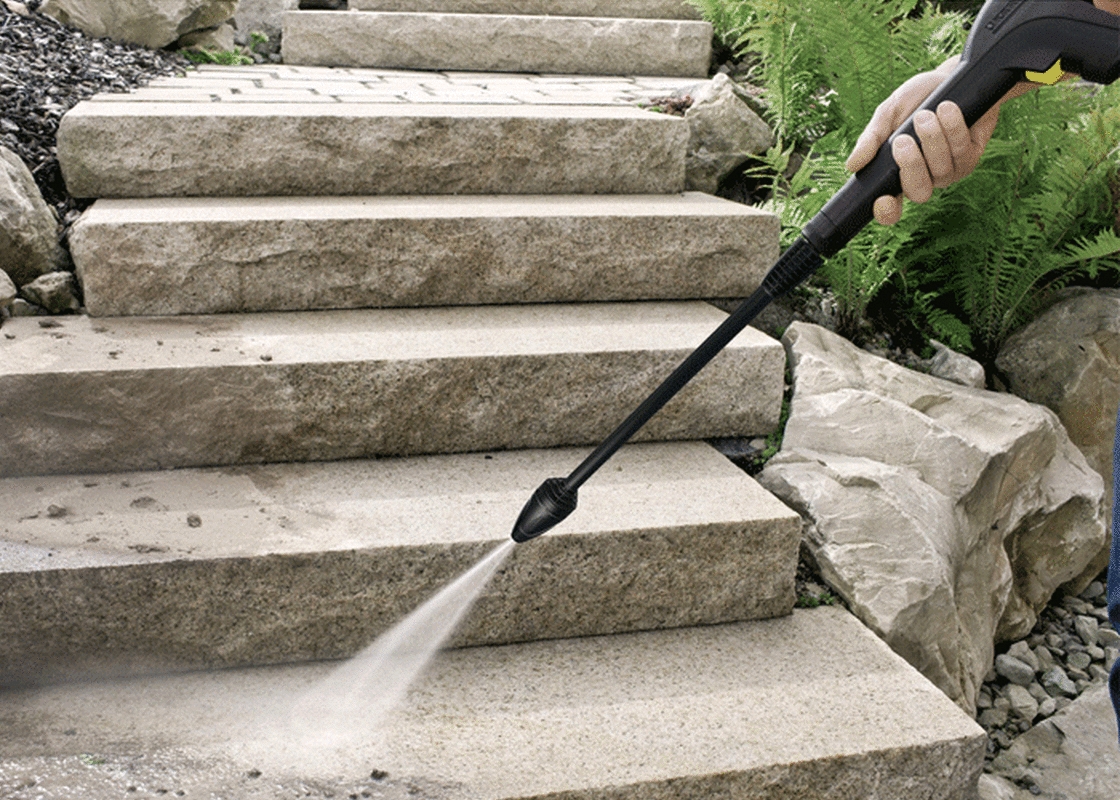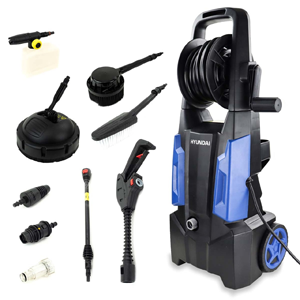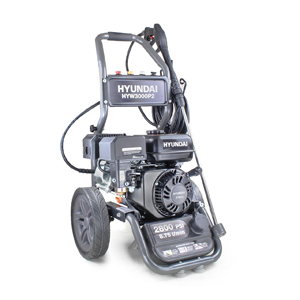Buying Guide: Pressure Washers

When it comes to cleaning dirt, grime and debris from surfaces, pressure washers are some of the most effective tools out there. You’ve probably seen them being used for washing cars, cleaning patios, or spraying exterior walls. These fantastic machines can shoot powerful water jets to clean surfaces quickly and easily – much more effectively than a garden hose!
However, if you’re looking for a new pressure washer, it’s easy to get overwhelmed by the wide range of models and different options available! So to help you find the best option for you, in this guide, we’ll cover the different types of pressure washers, what to consider when choosing your pressure washer, and our top picks.
Electric vs Petrol Pressure Washers
One of the very first and most crucial factors to consider when choosing a petrol washer is how it will be powered. There are two choices for power supply in a pressure washer – electric or petrol powered.
Electric Pressure Washers
By far the most common type, electric pressure washers are often affordable, compact and lightweight – making them ideal for various tasks around the home and garden.
While they may not be as powerful as their petrol counterparts, they are much more convenient and simple. As they run off mains electricity, all you need to do is plug it in, and you’re off! Electric pressure washers are comfortable to use and don’t require expensive, time-consuming maintenance like petrol models might.
Petrol Pressure Washers
Petrol pressure washers typically provide much higher pressure, power ratings, and flow rate. They can also be used for longer periods of time, don’t require a constant power supply, and can even use hot water to tackle the most challenging cleaning jobs. Petrol models are best suited for heavy-duty commercial and industrial industries such as construction and agriculture.
However, as they are powered by petrol, they require constant refuelling and maintenance, which isn’t cheap – on top of the already higher price tag. Since they are more powerful, they’re also heavier and louder than electric models and emit greenhouse gases when in operation.
Sealey PW3500
Electric Pressure Washer
Sealey PWM1300
Petrol Pressure Washer
What to consider when buying a pressure washer
When choosing which pressure washer to go for, it’s helpful to look out for some of the most important features and benefits you can get from your washer.
Pressure
Pressure, measured in bars, is essentially the force at which the water is expelled from the machine. The higher the pressure, the easier it will be to remove tougher or thicker layers of dirt and grime. Generally, high bar pressure over 120 bars is ideal for concrete or paving, while lower pressures are best for more delicate surfaces like finishes and paintwork.
Flow Rate
Flow rate, measured in litres per hour, indicates the water volume used by your pressure washer. A higher flow rate generally means that you’ll be able to finish the job more quickly, so in most cases, you’ll want to look for as high a flow rate as possible!
Power Rating
The power rating, measured in watts (W), indicates how powerful the pressure washer is. This is inherently linked to the pressure and flow rate – you’ll never find a high-wattage pressure washer with low pressure and flow rate! More powerful models will, of course, be more expensive but will make quick work of stubborn dirt and grime.
Hose Length
Hoses on pressure washers can come in various lengths, so you should consider this before making a decision. If you’re working at a distance from the water supply, then you might want to choose a longer hose to reach.
Accessories and extra features
It’s worth checking what useful accessories and extras are included to help you get the most out of your pressure washer. There are many different attachments, so you should consider which ones would be most helpful for dealing with the tasks you intend to use your pressure washer for.
Lances
Different lances can be attached to the hose to extend the reach or change the pattern of the water stream. Many of these feature variable pressure triggers so that you can change the power of the water jet by twisting the nozzle.
Attachments
Various attachments are available for pressure washers, designed to help with specific cleaning tasks. Brushes are great for dealing with tough dirt on sensitive surfaces, while patio cleaners are ideal for tackling flat surfaces like decking and patios. Foam nozzles are also perfect for helping to apply detergent when cleaning surfaces like cars.
Detergents
Many different types of detergents are available for when you need a little bit of extra help cleaning tough grime and muck. Detergents have specific formulas that are very effective at penetrating dirt and protecting the surface you’re cleaning.
Storage
Some pressure washers include onboard storage for attachments, accessories and other extras. If you’re short on storage space and want to keep your tools close by while you’re working, this is definitely something to look out for!
Our Top Picks
Now that we’ve covered what to look for when choosing a pressure washer let’s get into our top picks for the best pressure washers out there.
Karcher Pressure Washer K2
The Karcher K2 is one of the best all-around electric pressure washers available. Ideal for dealing with stubborn dirt on outdoor surfaces like patios, brickwork and walls, this Karcher pressure washer boasts a design that is not only lightweight and compact but also robust, combining portability with durability.
Makita HW101/2 Compact Pressure Washer
The Makita HW101/2 is a great domestic power washer, ideal for pressure wash driveways, patios and cards. Lightweight and affordable, it’s perfect for smaller jobs around the house and garden, with the electric motor delivering 100 bar water pressure.
Hyundai HYW1900E Pressure Washer
The Hyundai HYW1900E is a high-pressure midrange electric pressure washer with an excellent flow rate and accessory bundle. Offering 145 bar of pressure with a flow rate of 6.5L per minute, the HYW1900E easily handles any task around the home or garden, like washing cars, decking, furniture and stonework.
Draper 98679 Pressure Washer
The Draper 98679 is a professional, heavy-duty pressure washer that’s ideal for trade professionals and contractors. With 195 bar of pressure and a powerful brushless motor, this pressure washer can handle long sessions on the job site. The sturdy stainless steel components help prolong the machine’s life, with a long 8m hose for better reach.
Hyundai HYW3000P2 Petrol Pressure Washer
The Hyundai HYW3000P2 is a heavy-duty pressure washer powered by a 210cc 4-stroke petrol engine. Suitable for trade work, this pressure washer can handle the toughest cleaning jobs with ease – delivering a huge 2800psi of pressure and a flow rate of 8.75L/min.
FAQ
What is considered a good pressure washer?
Consider multiple factors when choosing an effective pressure washer. The Pressure Rating (PSI) should match your tasks—1,500-2,000 PSI for light operations, and 2,000-3,000 PSI for tougher tasks. Harmonise the Flow Rate (GPM) with PSI for optimal performance. Opt for a sturdy frame and quality materials for durability. Choose the power source based on your needs, electric for lighter use, gas for heavy-duty tasks. Assess attachments, nozzles, and adjustable pressure settings for versatility. Prioritise portability with a model featuring wheels and a compact design. Finally, select a reputable brand known for quality and customer support, and read user reviews for insights into performance and reliability.
Which pressure washer is the best?
Choose the best pressure washer by considering your needs and tasks:
- Cordless or corded options available
- Identify primary tasks like car cleaning or heavy-duty paint stripping
- Power source: electric for lighter use, gas for more power
- Pressure Rating (PSI): select an appropriate range for your tasks
- Build Quality: ensure a sturdy frame and quality materials
- Flow Rate (GPM): consider GPM in conjunction with PSI for optimal performance
- Tailor your choice for efficient and effective cleaning.
What is a pressure washer used for?
A versatile cleaning tool, the pressure washer excels in removing dirt, grime, and mildew from building exteriors, vehicles, driveways, and decks. It aids in fence maintenance, outdoor furniture cleaning, graffiti removal, and concrete surface preparation. Equipped with the right attachments, it’s suitable for window cleaning. In industrial settings, pressure washers play a crucial role in cleaning equipment and maintaining cleanliness. Adhere to safety guidelines and manufacturer recommendations when operating.
Is 2000 psi enough to clean concrete?
A 2000 PSI pressure washer is effective for cleaning concrete surfaces, removing dirt and stains from driveways, sidewalks, and patios. Consider the flow rate (GPM) and nozzle type for efficient debris removal. Maintain a safe distance to prevent concrete damage, and follow the manufacturer’s guidelines for optimal use.
Which pressure washer is best for cars?
Choose a car pressure washer with a moderate PSI (1,200-2,000) and GPM (1.4-1.6) for gentle yet efficient cleaning. Opt for adjustable nozzles and spray patterns to control force. Features like a detergent tank aid in dirt removal. The best cordless pressure washer offers easy manoeuvrability. Ensure adjustable pressure settings and sufficient hose length. Adhere to guidelines, use suitable cleaning solutions, and maintain a safe distance to protect your car’s finish.
At Toolden, we offer a wide range of electric and petrol pressure washers to suit a wide range of domestic and commercial applications.
Unsure of which pressure washer to go for? Need a bit of help with your order? Our new help centre has a wide range of helpful articles and guides!







